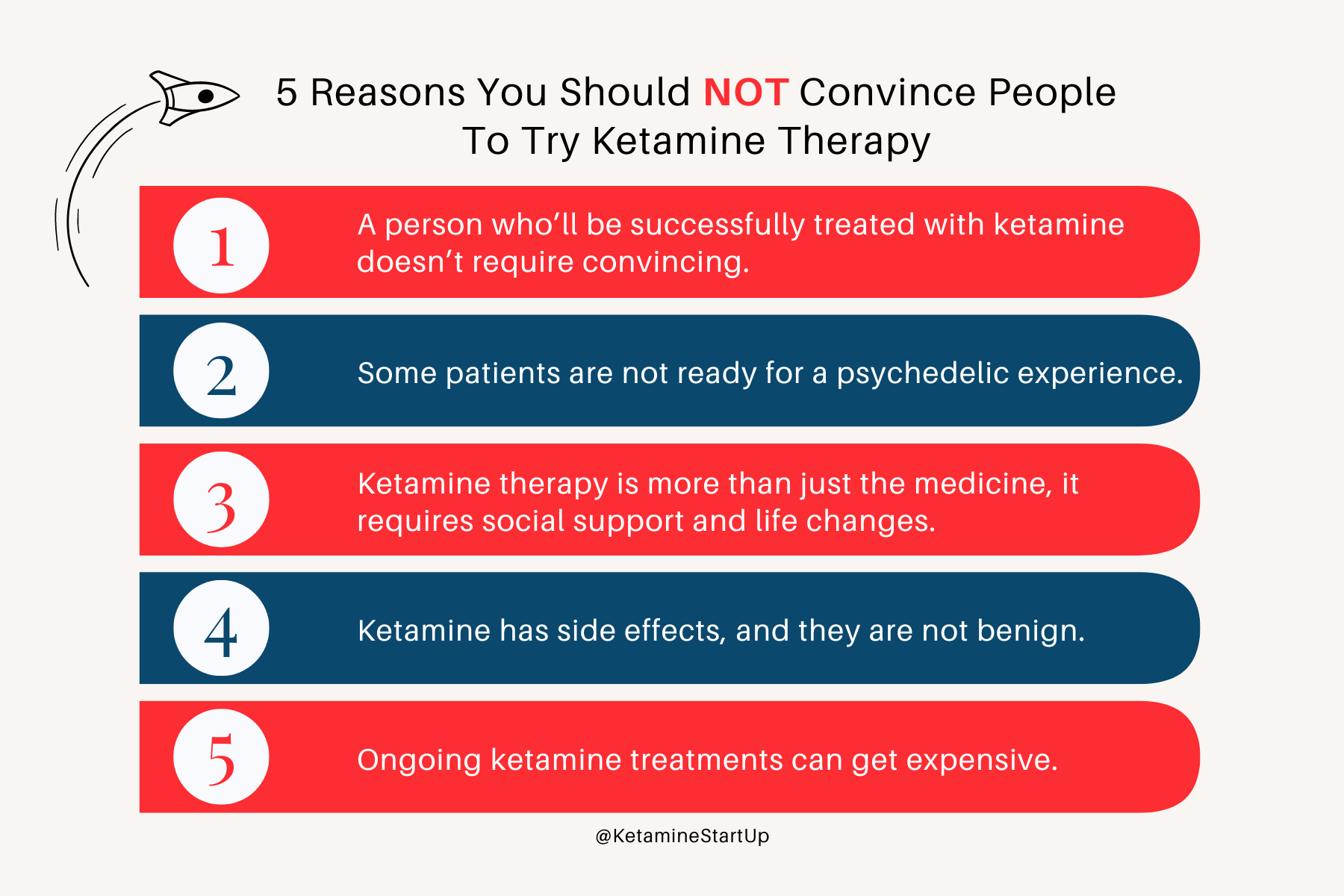5 Reasons You Should NOT Convince People To Try Ketamine Therapy
In this blog, explore five key reasons you should not convince or pressure patients into trying ketamine therapy, plus learn an ethical, patient-centered marketing strategy.
Should You Convince Patients to Try Ketamine Therapy?
As a clinician, you are used to the idea of seeing the same patients routinely. However, after opening or adding ketamine infusion therapy to your practice, you realize you won’t have that same steady flow of return patients. You’ve done the math. You’re thinking, “okay a new patient gets six infusions over two to three weeks. Then they may get a few boosters.” Okay, wait, how can I maintain a sustainable practice? I’ve left my stable salaried hospital position and what do I do now?
Ask a marketer or think logically; the answer then obviously becomes, get new patients! That can come in the form of providing boosters to patients who have already had the six initial treatments, but then you lose out on those six. So the thought pops in “convince someone who hadn’t thought about ketamine therapy to try ketamine.” Let’s sell that ketamine therapy!
Ah! But no. Don’t do it. Remember you are a doctor or clinician first. You are here to care for the whole patient and do no harm. Therefore, in this blog we’re going to share the reasons and explain why you shouldn’t try to convince anyone to try ketamine!
For those patients who get ketamine therapy based on someone else’s decision, they show little improvement.
Reason #1: A person who’ll be successfully treated with ketamine doesn’t require convincing.
Perhaps you’ve heard this joke, “How many therapists does it take to change a light bulb?” The answer being, “One, but the light bulb has to want to change.” Jokes carry a seed of truth, and this one is no exception. You’ll find sometimes the person requesting or scheduling the consultation for a ketamine treatment is not the potential patient themselves. It is their partner or child. Even when the potential patient is repeatedly asked if they actually want the treatment, they say "yes" but clearly just to appease their loved one. In our experience, these patients show little improvement. Your ideal patient is one that is willing and wanting ketamine therapy! As you'll see in Reason #3,ketamine therapy involves more than just infusions. Pushing unwilling patients into treatment does them a disservice and wastes time and resources.
Patients who are not ready for a psychedelic experience could have a traumatic ketamine experience if they force the issue.
Reason #2: Some patients are not ready for a psychedelic experience
Your clinic will see patients with varying familiarity with consciousness-altering substances. Some may be psychonauts who actively explore altered states, while for others, this is wholly new territory. Some patients may refuse ketamine because they are not ready for a psychedelic experience. The unknown can be scary - how to handle the experience and what support they'll receive. If your website and materials clearly explain your approach to guiding non-ordinary states of consciousness before, during, and after infusions, that addresses the fear. But if patients remain unready or unwilling, don't push it. Being unprepared for a psychedelic experience could potentially traumatize patients seeking help through this therapy. It's better they embark when fully ready. Forcing the issue does more harm than good.
Ketamine isn’t enough to make a patient better. A change in their lifestyle and having enough support are part of the equation.
Reason #3: Ketamine therapy is more than just the medicine, it requires social support and life changes
As mentioned earlier, ketamine therapy encompasses more than just infusions. While perspective shifts during treatments can be profoundly healing, sustaining change requires lifestyle adjustments and support. If patients are unable to make life changes or lack a support system (finances for integration coaching, therapy access, receptive friends/family), the benefit is potentially limited. Ketamine catalyzes change at a biochemical and psychological level, but patients must apply insights to their daily life. Ketamine alone doesn’t get the patient better. It is their actions in everyday life after and between treatments that make the difference. Without integration via routine actions and habits, symptom relief may only be temporary or negative outcomes could even occur (see Reason #4). Simply put, convincing patients to try ketamine without assessing their capacity to integrate insights is an incomplete treatment plan. Lifestyle and community support are essential components of care.
Ketamine therapy carries risks and this can be harmful for patients who are not ready or are not medically advised to try the medicine.
Reason #4: Ketamine has side effects, and they are not benign
Ketamine is no benign medication - its controlled status and consent requirements make clear it carries risks. As a clinician, you know ketamine's contraindications and potential for harm in excess. But what's the key takeaway here? If a patient must consent to treatment, inherent risks exist - physically and mentally. Inadequate screening or preparation could result in severe outcomes like hypertensive crises or psychological trauma. These are not minor side effects. Rather than convincing patients, they should convince you of their readiness. Building on what you have already learned in this blog, they need to want this treatment, be ready to have a psychedelic experience, and be prepared to make some lifestyle changes. The risk-to-benefit ratio is in favor for both you and your patient, when they are asking you to take them on as a patient versus when you are convincing them.
If you try to convince someone who cannot afford ketamine therapy to get treated, it’ll only cause them more financial burden and stress.
Reason #5: Ongoing ketamine treatments can get expensive
Ketamine therapy must be financially sustainable for patients. While insurance coverage is slowly growing, significant obstacles often exist. Even with coverage, patients may need to exhaust other options first. Working with insurances can lead to headaches for both you and your patients. Alternatives like care credit, HSAs, or superbills can ease out-of-pocket costs. But for many, paying fully out-of-pocket is unsustainable. Convincing patients to pursue unaffordable treatment adds financial stress to their existing struggles. Well-intentioned as it may seem, this causes harm. A thoughtful cost-benefit analysis with patients is essential so they can realistically budget and fund care. Financial limitations do not mean ketamine cannot help, but practical considerations regarding access must come first to fully serve our patients.
Your oath as a physician to do no harm outweighs your need for profit as a business owner.
Why You Shouldn’t Convince People To Try Ketamine Therapy
If the five reasons haven't convinced you, consider this - you are a clinician first, business owner second. Prioritizing profit over patient wellbeing is ethically dangerous. We've seen patients harmed and traumatized by unprepared, unintegrated ketamine experiences, excessive dosing, and clinics lacking trauma-informed care. Now imagine you pressure unwilling, unready patients into unaffordable treatment. The risks compound. There are going to be those who wholeheartedly disagree with this perspective, and we get it. However, convincing patients to try ketamine therapy can lead to crossing an ethical line. Those using such tactics often later lose these patients to us or similar clinics who put their patients first.
You must thoroughly inform and assess patients' readiness and capacity to integrate this powerful treatment. When patient wellbeing is the priority, your practice will sustain itself. Ethics and outcomes go hand-in-hand.
To attract more patients, focus on educating rather than trying to convince them yourself that they need ketamine therapy.
So How Should I Market My Ketamine Clinic?
Use a "pull" not "push" strategy. While convincing "pushes", “pulling” educates, entertains, and inspires. Educate potential patients on what to expect during and after infusions. Share entertaining realities of the process. Inspire aspirations for healing and growth. This strategy attracts the "right" patients for you - those well-suited to your specific approach, brand values, and clinic culture. You’re patients’ healing and your success is a partnership between you and them.
For ketamine therapy, the clinician shapes the experience and outcomes. How you market and conduct your practice affects patient journeys. More than the medicine itself, you as physician and business owner catalyze healing through your way of being and therapeutic approach. Patients are drawn to clinics aligned with their needs and values. Do YOU want a ketamine clinic that flourishes? Then put the patient first, by leading with education and ethical care.
Related Questions:
How can you address patients' fears or concerns about the psychedelic aspects of ketamine therapy?
Seek furthering your own and staff’s knowledge in psychedelically and trauma-informed care. From there, think about what concerns and questions your patients would have and have your website and marketing material answer these questions. Be sure to state how you will be able to support and guide these non-ordinary states of consciousness before, during, and after infusions.
How do you recommend successfully marketing a ketamine clinic?
Focus your marketing on educating, inspiring, and attracting ideal patients rather than convincing them. Create and share informative and relatable content about your therapeutic approach, brand values, and clinic culture. This will draw patients who align with your approach to ketamine therapy. More importantly, put your patient’s entire wellbeing first, and have your reputation and patient outcomes speak for themselves. Successful marketing starts with how you practice medicine. Doing good, heart-centered work will organically attract appropriate patients seeking your unique approach.
If you enjoyed this blog, check out these too!
Maximizing Your Network: Building Referral Relationships for Your Ketamine Clinic
Discover five key steps to build and maximize referral relationships for your ketamine clinic. With actionable tips on identifying and connecting with potential referral sources, plus insights on establishing a strong online presence and maintaining sustainable relationships you’ll be set to create your network.
Attracting Ketamine Infusion Patients: Mistakes To Avoid
The world of marketing is an entirely different world for physicians, and we’ve made plenty of mistakes along the way as ketamine clinic owners. In this blog, we talk about these mistakes and the lessons that will help you choose the right marketing strategy for your clinic.
Why You Shouldn't Market Your Ketamine Clinic On Social Media
Nowadays, every business is marketing online. But are there reasons why you SHOULDN'T market your ketamine clinic on social media? Read our blog post to find out.












Texas proposes mandatory ketamine clinic registration, onsite physician requirements, and home-use ban. What it means for your practice and the industry.